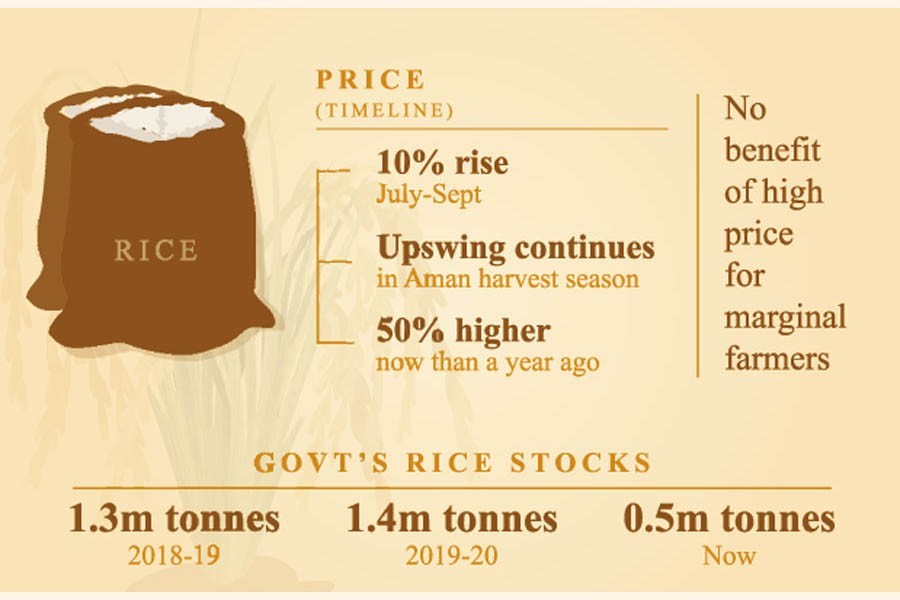
Published :
Updated :

Both consumers and marginal farmers are suffering as prices of rice continue to surge, analysts said on Sunday.
To remedy the situation, they suggested forming an Agricultural Price Commission to protect the interests of both small-scale farmers and low-income consumers.
The suggestion came at a virtual dialogue on "Why is price of rice increasing? Whose loss, who gain?" organised by Oxfam.
The mismatch between the government data on rice output and its availability, the delay in import decision, lower grain stock, failure to procure locally and hoarding by millers and seasonal traders were identified as the major reasons for sky-high price of the staple.
Lawmakers Emaz Uddin Pramanik and Umme Kulsum Smrityl, former research director of Bangladesh Institute of Development Studies (BIDS) Dr Md Asaduzzaman, former director general of BIDS Dr Quazi Shahabuddin, director of Channeli Shykh Seraj spoke at the dialogue, moderated by distinguished fellow of the Center for Policy Dialogue (CPD) Dr Debapriya Bhattacharya.
Dr Asaduzzaman said price of rice soared in July-September last year by 10 per cent and the uptrend continued rising in the Aman harvesting season.
He said coarse rice prices are now around 50 per cent higher than a year ago.
But small farmers having lower than an acre of land could not get the benefits of price spike as they had to sell grain at cheaper rate just after harvesting to prepare the land for the next crops, he said.
Now these farmers are buying the staple at much higher rates, he added.
Despite the outbreak of the new coronavirus, Boro rice production set a record, he said, regretting the farmers didn't get any incentives, though bumper output helped the country minimise economic shock.
He noted rice stock at the government warehouses was 1.3-1.4 million tonnes in 2018-19 and 2019-20, which slipped to only 0.5 million tonnes.
Such low storage has also been causing hike in prices, he said, terming the government agency's rice production data 'confusing.'
And this caused delay in making import decisions, he said.
Dr Quazi Shahabuddin agreed that low storage has a speculative impact on the market.
He said if the government has no sufficient stock, it makes millers and other big players think they could fix prices at their whim.
He said the government's failure in domestic procurement and the delay in import policy review have also caused surge in rice prices.
He also blamed illegal hoarding for the irrational price hike in rice.
Dr Shahabuddin said rice price hike usually benefits millers and seasonal and regular traders deprive both farmers and consumers.
Shykh Seraj said the existing 25 per cent import duty is rational both for consumers and farmers.
He argued if the present import duty continues, coarse rice could be retailed at Tk 40-41 a kg, which will help farmers minimise losses.
Bangladesh Rice Research Institute (BRRI) director general Dr Md Shahjahan Kabir said his agency has conducted a study, which revealed that rice production might decline by 1.5 million tonnes in Aman season.
But taking in hand a record 20.1 million tonnes in Boro and a handsome 3.3 million tonnes of production in Aus season, their prediction was the country might have a rice surplus of 3.0 million tonnes until June 2021.
He said the calculation was made taking 405 gramme per head daily intake of rice by 16.7 million people plus non-human consumption into account.
The Bangladesh Auto Rice Mill Owners Association president AKM Khorshed Alam Khan, said bank interest rate for millers should be fixed at 2.0-4.0 per cent considering it an agro-based industry.
He said slashing interest rate could help cut rice prices at the mill-gate.
The Bangladesh Rice Exporters Association president Shah Alam Babu said import duty should be lower than 20 per cent to make coarse rice cheaper.
He said the government should also permit exports of fragrant rice so that we can import a large amount of coarse rice.
Aizar Rahman, a farmer from Gaibandha Sadar upazila, said he sold paddy just after harvest in Boro season to pay dues and to prepare land for Robi crops.
"But later we saw paddy was selling at much higher rate by seasonal traders," he said.
He said if the government sanctions loans to the farmers during harvesting seasons they would be able to preserve paddy for two or three months. Most of the participating farmers also echoed his views.
Bangladesh Krishak Samity president Sazzad Zahir Chandan said the government should open the food storage at every union, which might cost Tk 50 billion.
The government must procure rice and paddy from the farmers and could preserve those at the union storage, which could further help improve the country's food security, he added.
Dr Bhattcharya said the commission will be responsible for fixing logical prices for farmers and consumers based on season-based scientific methods.
tonmoy.wardad@gmail.com


 For all latest news, follow The Financial Express Google News channel.
For all latest news, follow The Financial Express Google News channel.